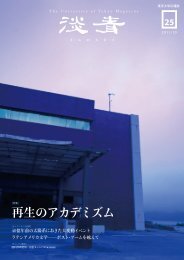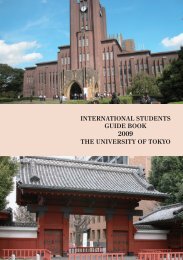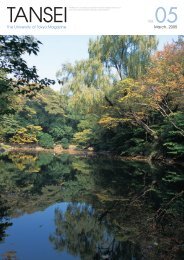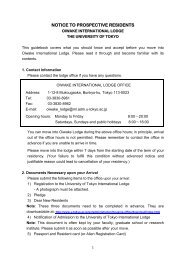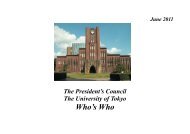brochure
brochure
brochure
You also want an ePaper? Increase the reach of your titles
YUMPU automatically turns print PDFs into web optimized ePapers that Google loves.
fact that courses are taught entirely in English by a staff of internationally<br />
recognized scientists in these departments.<br />
Support System<br />
The Program supports national and international students in many<br />
ways to nurture and guide them through the Program. Lectures and<br />
guidance on interdisciplinary topics are provided. All five engineering<br />
departments cooperate to support the students. The teaching<br />
staff advises on thesis preparation in English, and classes on practical<br />
Japanese conversation are provided. The Admissions Office of<br />
our own handles admission, guiding students through the formalities<br />
of traveling to Japan, and so forth. The School of Engineering coordinates<br />
the global operation of the program.<br />
Special Graduate Program<br />
in Engineering for Systems Innovation Master’s/Doctorate<br />
The Department of Systems Innovation, the Department of Nuclear<br />
Engineering and Management, and the Department of Precision<br />
Engineering in the Graduate School of Engineering offer advanced<br />
study and research opportunities to international students under the<br />
Special Graduate Program in Engineering for Systems Innovation.<br />
A maximum of ten students enrolled in this Program will be<br />
awarded scholarships from MEXT, the Japanese Ministry of Education,<br />
Culture, Sports, Science and Technology. The scholarship<br />
covers living expenses and a roundtrip air ticket.<br />
The Program offers Master’s (two years) and doctoral (three<br />
years) programs leading to corresponding degrees in the three<br />
departments.<br />
The Department of Systems Innovation, which was established<br />
April, 2008, aims at research and education that contribute to realization<br />
of innovative systems by integrating engineering knowledge<br />
presently divided in separate domains. In the department, more<br />
than 40 faculty members with diverse engineering backgrounds<br />
cooperate in the conduct of research and education programs<br />
focusing particularly on four topics of artifacts network systems,<br />
global circulation systems, socio-economic systems, and advanced<br />
system design methods.<br />
The Department of Nuclear Engineering and Management was<br />
established in April 2005 to promote research and education not<br />
http://www.sys.t.u-tokyo.ac.jp/specialE.html<br />
only on traditional nuclear technologies but also on newly expanding<br />
fields relevant to nuclear energy such as advanced nuclear<br />
technology for the future, advanced laser-beam technology, medical<br />
physics, and nuclear socio-engineering.<br />
The Department of Precision Engineering, with a long history, is<br />
promoting applied research and education focusing on engineering<br />
technologies such as sensing technology, fabrication technology,<br />
microsystems, mechatronics, and engineering technology for<br />
design and production systems. Research and education in this<br />
department aim for specific problem-solving in industry and society<br />
using a combination of these five technologies.<br />
Lectures and instructions for research in the three departments<br />
are generally given in English, while Japanese language courses<br />
are optionally available. The educational curriculum covers traditional<br />
engineering subjects, fundamentals of interfacing areas among<br />
engineering and social, human, economy, management sciences,<br />
and domain-specific subjects so that students can acquire comprehensive<br />
and interdisciplinary viewpoints. In addition to lectures,<br />
opportunities for practical exercises and internships in Japanese<br />
corporations or institutes will be provided. Those who graduated<br />
from this program in the past now hold leading positions at government<br />
offices, corporations, universities, and institutes worldwide.<br />
Degree Programs Offered in English<br />
Specially-promoted Graduate Program<br />
for Creation of the Asian Engineering Framework<br />
Based on Tripolar Alliances among Japan, China and Korea Doctorate<br />
http://www.oice.t.u-tokyo.ac.jp/special/index.html<br />
This Program, through the creation of a framework based on<br />
connections among Japanese, Korean and Chinese educational<br />
institutions in the field of engineering, aims to nurture individuals<br />
with an international perspective capable of supporting the sustainable<br />
development of Asia as a whole. Seoul National University<br />
and Tsinghua University, located in the capitals of each country<br />
respectively and Korean and Chinese research and educational<br />
institutions of the highest level, individually select candidates first.<br />
Then, the University of Tokyo shall further select the individuals to<br />
join the doctoral program. Also, by holding academic symposia<br />
together, we deepen the relationship among international students,<br />
faculty members and departments of the three universities,<br />
in addition to building a developing and supportive relationship. The<br />
University of Tokyo is acting as a pioneer in the establishment of the<br />
Asian Engineering Tripolar Framework, and shall contribute to the<br />
stability and development of the region by nurturing international<br />
human resources within the framework.<br />
This Program, as a graduate school-wide project of the School<br />
of Engineering for the education of international students, shall be<br />
under the leadership of the Department of Bioengineering. The<br />
Department of Bioengineering is a new major field of academic<br />
endeavor at the Graduate School of Engineering, and has outstanding<br />
research and educational characteristics. Further, along<br />
with flexible transfer of academic skills and staff from existing<br />
departments, this department aims to create new academic skills<br />
that broadly cut across existing disciplines. As the vanguard in<br />
the development of the Engineering Framework, the University of<br />
Tokyo shall accept international students from not only from the<br />
field of Bioengineering but also environmental studies and other<br />
fields covered by the program. Internationalization programs and<br />
relationship building with neighboring countries are already carried<br />
out in English; therefore, English shall be the core language of this<br />
program as well. However, in order to promote mutual understanding<br />
not just in cutting-edge science but also in culture, and to<br />
enrich the daily lives of international students, beginner-level Japanese<br />
language courses will also be provided for those who are<br />
interested. Japanese Language education classes at the Graduate<br />
School of Engineering and existing departments’ Japanese<br />
classes are unique in Japan in that Japanese is learned within an<br />
English-language environment in all classes. International students<br />
who prefer to study Japanese in the intervals between lectures<br />
and research can make use of the existing Graduate School of<br />
Engineering Japanese language classes; those who prefer more<br />
concentrated study in a block of time in the afternoon or evening<br />
can take the opportunity for intensive study in Japanese classes at<br />
the existing departments’ language courses.<br />
58



